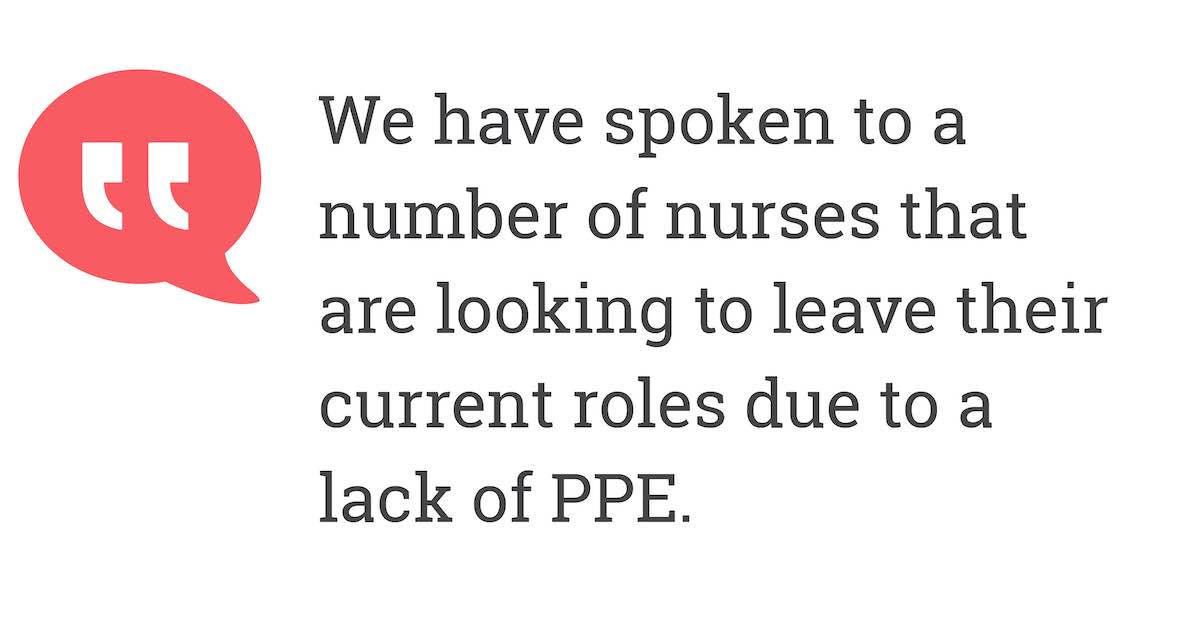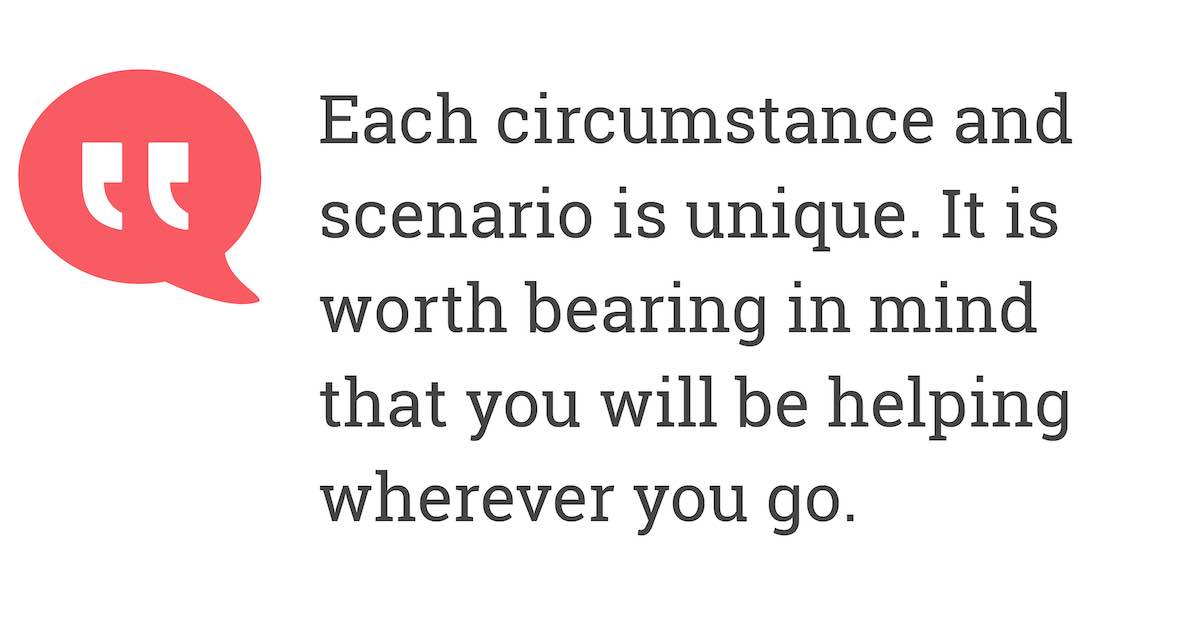- 09 June 2020
- 11 min read
Healthcare Recruitment: How We’ve Adapted To Combat Covid-19
- 4150
 "It’s significantly changed the way people view the profession for the better."
"It’s significantly changed the way people view the profession for the better."Appoint Group boss covers the fallout of Covid-19. PPE, a major reason for nursing resignations and THE key recruitment topic. Plus, it's put care home nursing on the map as a vital career move.
Topics covered in this article
What changes have you made as a result of Covid-19?
Has Coronavirus changed the types of jobs you're seeing coming through?
Are nursing and other healthcare workers asking about PPE and other infection controls in place?
What further changes do you expect to see over the next few months?
What advice would you have for employers that are looking to hire qualified healthcare professionals?
What changes have you made as a result of Covid-19?
All of our team are working from home, with our full team still in play and no-one being furloughed.
We are fortunate that we were well set up for remote working already, so operationally it has been quite straightforward for us.
The team have been doing a great job of keeping their motivation up and working harder than ever to help our clients cope with these new challenges.
From the perspective of our candidates and clients, we have been very keen to encourage the use of video interviewing and are offering technological solutions to facilitate this.
We saw some initial hesitance from clients to get comfortable with video interviews, though more and more are taking us up on this option now.
Has Coronavirus changed the types of jobs you're seeing coming through?
We’ve not personally seen much change here, though we are very niche, which might shield us from fully seeing changes.
Demand for qualified nurses still largely outweighs supply, so it is business as usual for us and our clients, in the respect that they are still recruiting.
We thought that focus might switch from permanent nurses, to agency or bank supply.
However, most clients are providing a service for those with a vulnerability to Covid-19 and are therefore reluctant to bring anyone on-site that they don’t absolutely have to.
Therefore, permanent or full-time nurses are preferred still, wherever possible. We haven’t seen a drop in demand at all.
Are nursing and other healthcare workers asking about PPE and other infection controls in place?
Yes. Understandably, nurses are seeking reassurances that they are moving to an employer that provides them with as much safety as possible.

We have spoken to a number of nurses that are looking to leave their current roles due to a lack of PPE.
We are regularly asked about this when discussing prospective employers, and candidates want to know that this is adequate before committing to applying.
We are obtaining this information from our clients upfront, so we have this information readily available for candidates.
What further changes do you expect to see over the next few months?
The number of qualified nurses looking for permanent jobs has clearly been slightly lower more recently, though not as low as we might have expected.
There are definitely people still looking to make changes in their career for various reasons.
We hope to see an increase in Healthcare candidates looking for work, returning to pre-Covid 19 levels as the restrictions are lifted.
As the peak number of cases starts to move further behind us and as the stresses of coping start to reduce slightly, as they are doing, we anticipate that more and more individuals will be confident to change jobs
As children return to school, parents will have more flexibility with shifts and work patterns.
The guilt factor has also been playing a part.
Some have found it difficult to leave their current employer at a time of need, even if they feel strongly that it is the right thing for them or their own families.
Over time, we will see these issues reduce and a simultaneous increase in desire to visit the prospective workplace and meet interviewers in person.
We’ve seen that the nursing home sector in particular has been rising in popularity over the last few years.
The role of a nursing home nurse has gone up in stature over the last few years.
For example, less often do we hear that hospital nurses view working in a nursing home as a step backwards.
Instead, there is a new perspective on the block; nursing home nurses are now seen as the ultimate generalist.
They have the ability to excel in a number of skillsets.
It’s true that the care home sector has been badly affected by the pandemic, however we are confident that, from a staffing point of view, it will recover and continue to be more and more attractive to qualified nurses and skilled care professionals.
Some are concerned that the publicity around the sector will have made the sector vastly less attractive to people when considering their career options.
Our personal view is that it has put nursing and care homes much more clearly on the map.
It has shown the sector more clearly for what it is; a career that brings true heroism to the forefront and offers a type of career satisfaction that so many people miss from the majority of other careers.
It’s significantly changed the way people view the profession for the better.
And I think this can only be great news for the future recruitment prospects of these businesses.
What advice would you give to Nurses, Home Managers, HCAs and other Care Workers considering their career right now?
Like all of us, regardless of profession, healthcare professionals are looking for normality and certainty, from any area of their life.
The jobs market is still very much in motion and for those that want to make a career move, there is no reason why they shouldn’t do so.
For those that do want to change jobs, you may need to be understanding of some unorthodox processes, though people are adapting and becoming more used to this in all walks of life now.
We do hear that people are occasionally worried about leaving their current role, perhaps when they are needed the most.
This feeling of guilt is often present in this sector at the best of times, because nurses are always in short supply relative to the number of vacancies.
Certainly, we are hearing a number of employers using this as a means to convince people to stay.

This is a judgement call that an individual needs to make, and each circumstance and scenario is unique.
It is worth bearing in mind that you will be helping wherever you go.
You shouldn’t feel guilty about advancing your career.
You work with care homes and mental health care workers - can you explain how Coronavirus has impacted recruitment differently across these practice settings?
All services have changed their recruitment process, most have more recently either been conducting interviews via phone or video interview.
A positive outcome of the pandemic is that we have seen candidates starting in their new roles on average 10 days quicker than last year.
This is because the compliance, training and onboarding process takes much less time and clients are more keen to get candidates started to fill their vacant hours.
Compliance documents for completing DBS checks are now accepted via video verification.
Additionally, a lot of organisations have condensed their training and induction programme as they are only able to do theory rather than practical training.
Some services are also adapting well to virtual training and are completing some e-learning and some training days hosted via Zoom.
We do have to be careful with this as much of the training is difficult to replicate digitally.
However, for much of it, this is proving very effective and much more streamlined.
Induction dates are now more frequent in order to have fewer candidates inducted at the same time, particularly within mental health services - this is a great help for our candidates who previously would have to wait another month if they couldn’t attend a monthly induction date.
Whilst the majority of nursing homes still have vacancies, we are sad to say that a small percentage of care homes have put their recruitment on hold due to a significant number of deaths within their services and now have a reduced need for new staff as a result.
Some mental health services have had to take on NHS patients to free up wards for Covid-19 patients, therefore have expanded their services quicker than they anticipated, increasing the number of immediate nurse vacancies.
On the other hand, other mental health services have stopped patients coming into the service and have therefore had to close wards for the time being, reducing the number of staff required.
These examples are few and far between and have for the most part resulted in them redeploying staff to other areas of the organisation or in a very small number of cases, making a number of redundancies.
We do hope and anticipate that these companies will bounce back very quickly.
The demand is still very much there for such services.
It has a temporary block in place which we are already starting to see being dissolved.
What advice would you have for employers that are looking to hire qualified healthcare professionals?
Hiring managers need to remember that, now as much as ever, prospective future employees still need to feel valued.
Companies have realised that ‘rolling out the red carpet’ for potential new hires is an important part of what drives hiring success.
Simple things like showing them around, allowing them to meet the team, or getting them a drink at an interview are all now much harder.
Think about how you can replace these usual processes with digital versions. There are lots of things you can still do; making sure the telephone or video interview starts on time, providing timely feedback, and making yourself contactable for questions.
We know that, with the additional strains brought on by the pandemic, this is sometimes hard to achieve.
At the same time though, these basics have become more important than ever and we are seeing employers get this wrong and lose hard-to-find candidates as a result.
We are seeing a trend where hiring managers don’t place the same level of significance towards a telephone or video interview when compared with a face-to-face interview.
More and more are inclined to postpone or let applicants down by not showing up for the call.
Granted, it is likely that this is partly due to the increased demand on everyone at the moment.
But if you aren’t doing a face-to-face interview, this becomes more important, not less important.
Now more than ever, you need to show your interest and sincerity towards hiring a new person into the team in any way that you can.
At the moment it is very much about winning their trust, so these basic steps are vital.
About Appoint Group
APPOINT HEALTHCARE - Renowned for exceptional service quality by healthcare professionals and job seekers, and known to offer the highest standard of candidate by our clients.
Our healthcare division covers the entire of the UK, focusing on placing top quality professionals across specific and specialist areas within the private healthcare industry.
These include Mental Health, Learning Disability, Allied Health, Hospitals, GP Surgery, Walk-in Centre / Out of Hours services, Community/Homecare, Pharmacy and Dentistry.
We cover all skill-sets within these service types.








Managing Director of Appoint Group
About the author
Managing Director of Appoint Group
Founder and current Managing Director of Appoint Group; a fast paced, rapidly growing Recruitment Company, predominantly specialising in Nursing & Healthcare, Consulting Engineering and Commercial recruitment and encompassing a number of specialist areas within each.
Read something else
About Our Health And Social Care Recruitment Services
In March 2024 16,000 applications were made across our four websites. Find out how we can help you hire!
Nurses.co.uk: The Different Approach
Nurses.co.uk is a job site like no other. Its history, along with its new endeavours come together to create something unique. In this piece, we take a peak behind the curtain at nurses.co.uk.
Overseas Health Workers Get Free Visa Extension But Care Workers Miss Out Again
Thousands of health workers from overseas breathed a big sigh of relief recently as it was announced that those whose visas were set to run out in the near future would enjoy a free one-year extension
Latest Jobs
Dental Nurse
Leeds, West Yorkshire, England
Nurse Seekers
Care Asistant
Axminster, Devon, England
Avon Search & Selection Ltd
Irish Prison GP Locum
Limerick, Limerick, Ireland
TTM Healthcare Solutions
Staff Grade Psychologist - Dublin
Dublin, Dublin, Ireland
CPL Healthcare
Senior Grade Psychologist - Cavan
Cavan, Cavan, Ireland
CPL Healthcare
Senior Grade Psychologist - Cavan, Part Time
Cavan, Cavan, Ireland
CPL Healthcare